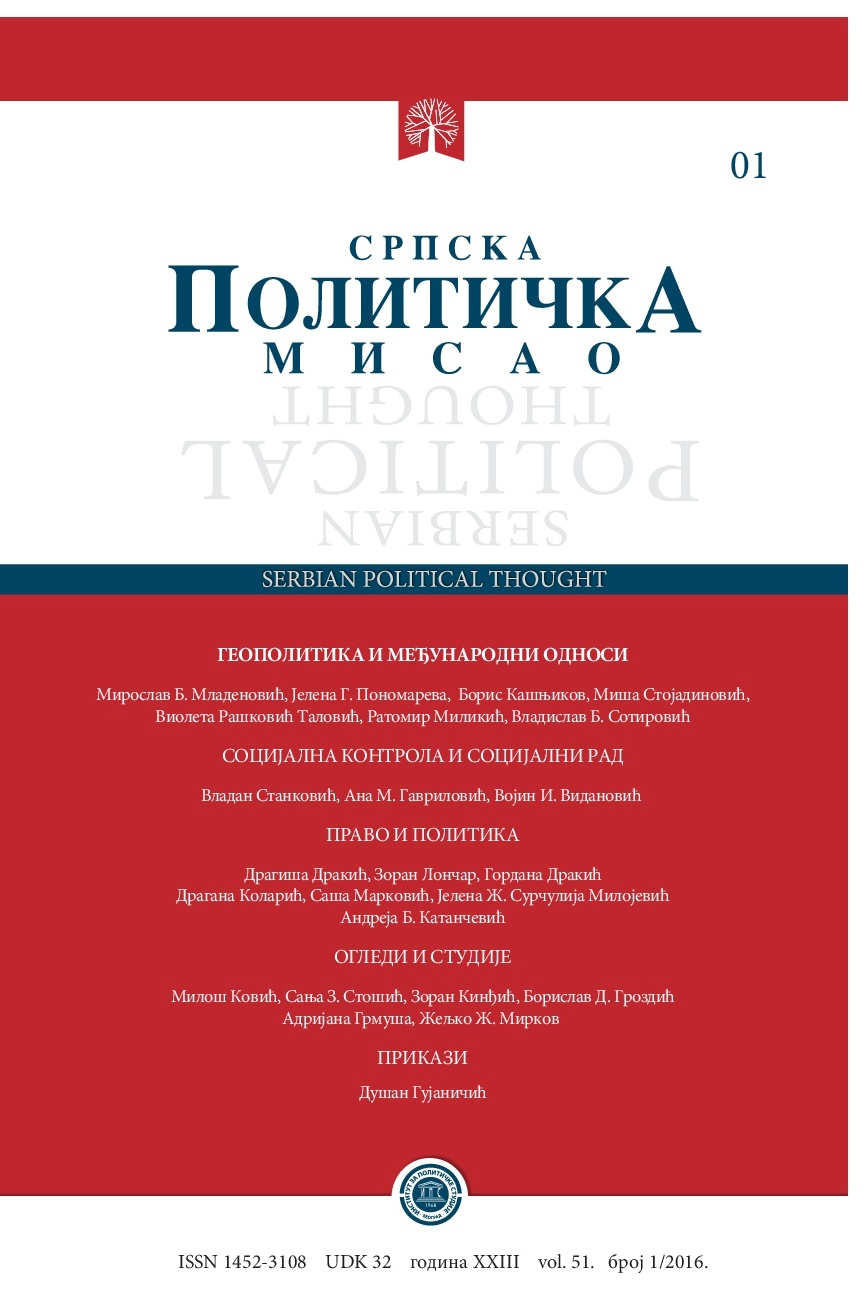Садржај медијског простора у Србији током 2015. године
Content Analysis of Serbian Media Space During 2015
Author(s): Sanja StošićSubject(s): Politics, Media studies, Politics and communication, Present Times (2010 - today), Globalization
Published by: Институт за политичке студије
Keywords: Media; media space; public sphere; audience democracy; content analysis; reality show; tabloidization;
Summary/Abstract: In terms of media and media sphere, this paper deals with the presumption of existence of public democracy. However, global culture defines the time we live in, as well as the commercialization of media space. In contemporary practice, the creators of public opinion are political figures, power centres, the media and the citizens. Neoliberalism in all spheres of life, wants to present itself as a synonym for freedom and democracy, but ethical values are degraded, intellectual critical awareness is overpowered by public ignorance and interpretations of media owner’s desires and intentions. In response to this climate, media regimes pursue profit, not public service goals. In other words, the democracy is framed by the commercial public sphere and the media content is linked to the formation of audiences’ assumptions about political practice. Thus, in the name of democracy, media space develops the idea of market forces rather than participary democracy and true public interest. In such circumstances, instead of informing citizens, the role of media is primarily to misinform and confuse them by “making the unimportant important”. In that way, the media content functions аs a weapon in peace, where competing interests battle over the creation and interpretation of meaning and reality. With growing uncertainty that contemporary citizens face, the cultural globalization of the entertainment industry seems more pronounced аnd the complexity of modern media space has brought to culture hybridization аnd increased popularity of reality shows whose participants act as the rats in a cage who will do anything for money. Also, because reality show focuses on random occurrences in people’s lives (with the help of some producer magic) there is no expectation for what could happen and constant fights and intense quarrels create one-dimensional man who in the “society of the spectacle” follows the the rule “if it bleeds, it leads”. However, contrary to its title, reality show does not represent true reality. Instead, it does exactly the opposite by displaying a superficial world that doesn’t exist, but the more viewers indulge in false realities, the more they lose focus with what is really going on in their lives. Nevertheless, it appears that the „rooting” in new identities аnd dispersion of power actually leads to a new, hidden restrictions of freedom, making citizens passive observers. On the other hand, the wide variety of reality TV shows intensisifies the cultural commodifcation and sets unrealistic standards for real life. The more ordinary people admire the “reality stars”, the more power these shows gain over the youth, society values and the media space. The current paper has examined the quantitative and qualitative aspects of Serbian media space during 2015 within the context of media content analysis. In the realm of Serbian democracy system and never-ending privatization process, manipulation appears inevitable because there are no enough resources for media independency. Analyzing contents of the most investigated daily newspapers in Serbia, main research findings in the field show that Serbian media coverage is mainly oriented towards protocol news and mainstream political practice, while journalists mostly rely on local governments and state institutions as sources of information, or even worse, on unknown sources. Accordingly, political and economic topics prevail, while citizens and their everyday problems remain on the margins of local media coverage. Additionally, in order to promote global-local success, the media industries have included content adaptations in television programming by adopting various reality shows that cross the line of decency. In conclusion, it is obvious that different media genres have their specific discourse through which sublimal messages are being sent to the audience. Unstable nature of the truth provided by various interpretations leads to abandoning of professional principles in journalism and their substitution with informative and entertaining contents. Within this context, news are losing their character as a public value and are becoming merchandised. Nevertheless, the aim of this paper is to highlight the fact that the media should not be viewed strictly as an instrument of political power, but also as an agent of social change and progress. Therefore, in this context the question of media literacy, diversity, ownership and content regulation are presented as the most important aspects of the quality of public discourse.
Journal: Српска политичка мисао
- Issue Year: 2016
- Issue No: 1
- Page Range: 253-277
- Page Count: 25
- Language: Serbian

